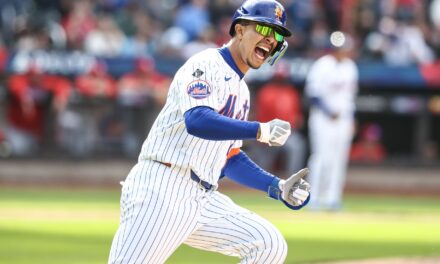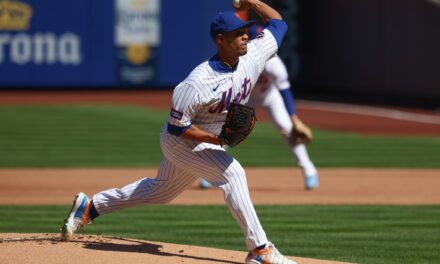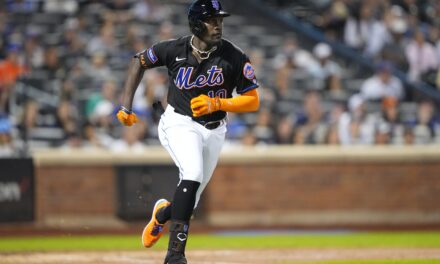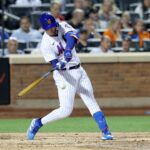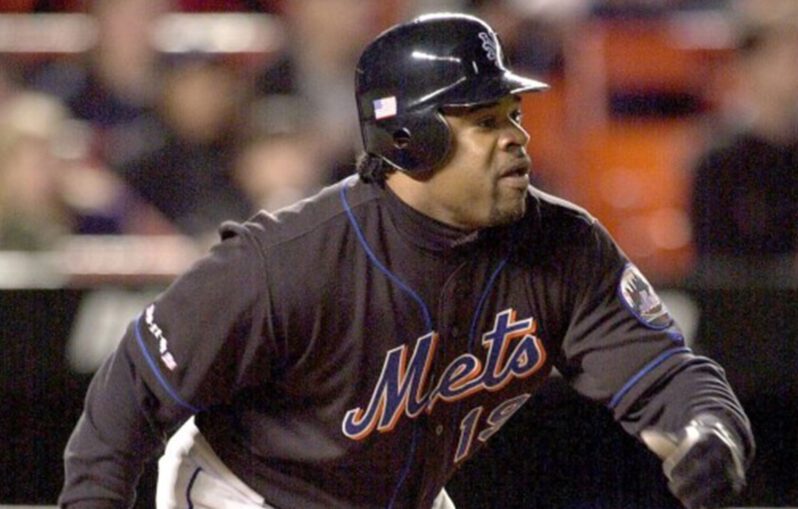
As the calendar turned to June in the year 2000, the Mets sat just five games above .500, and already seven games behind the Atlanta Braves.
Relative to their standing the prior June in 1999, things could have been worse. Derek Bell (.873 OPS) and Todd Zeile (.919) were both raking in the place of Roger Cedeno and John Olerud, but the offense still lacked the depth that would eventually push it over the top in the final month of the season.
Darryl Hamilton was nursing a sprained foot that wouldn’t heal until early August. An underperforming Rickey Henderson had been released three weeks earlier. Jay Payton and his .214/.270/.340 line didn’t look like a sufficient answer, and Benny Agbayani‘s .268/.326/.366 clip wasn’t too encouraging, either. Matt Franco hadn’t recorded even one extra-base hit to prop up a .182 batting average. Melvin Mora‘s defense at short was a far cry from that of the injured Rey Ordonez. Even Timo Perez was still three months away from entering the equation.
Save for Joe McEwing, who had to this point only been in New York for three weeks, the Mets lacked just about any inspiration off the bench, and team general manager Steve Phillips acted promptly. In what would turn out to be the team’s first major transaction of the regular season, the Mets sent struggling left-hander Bill Pulsipher to the Arizona Diamondbacks for an accomplished pinch-hitter in Lenny Harris.
Through his first 12 years in the major leagues, Harris had amassed 115 hits off the bench, with a couple of these knocks coming in his first tour of Queens during the summer of 1998. He needed 35 more pinch-hits to tie Manny Mota‘s career-record 150, but he left the D-Backs with a .468 OPS in his age-35 season. The odds were stacked against Harris, and they only stayed that way as he went hitless through his first 12 at-bats.
Fortunately for the organization, the clubhouse favorite would quickly thereafter find a niche as one of Bobby Valentine‘s best weapons. In 76 games (51 as a reserve), Harris hit .304/.381/.457, raising his OPS over 200 points in the process. His 15 pinch-hits tied Colorado’s Terry Shumpert for the major-league lead, but he did so with an offensive WAR (1.0) twice as high as Shumpert’s (0.4).
Entering the All-Star break, the Mets had improved to ten games above .500, and had reduced the gap in the NL East to just three games. By August 26th, the Mets were 23 games above sea level, and while they remained second-fiddle to Atlanta, they now boasted the second-best record in the National League, and led the Wild Card race by four-and-a-half games.
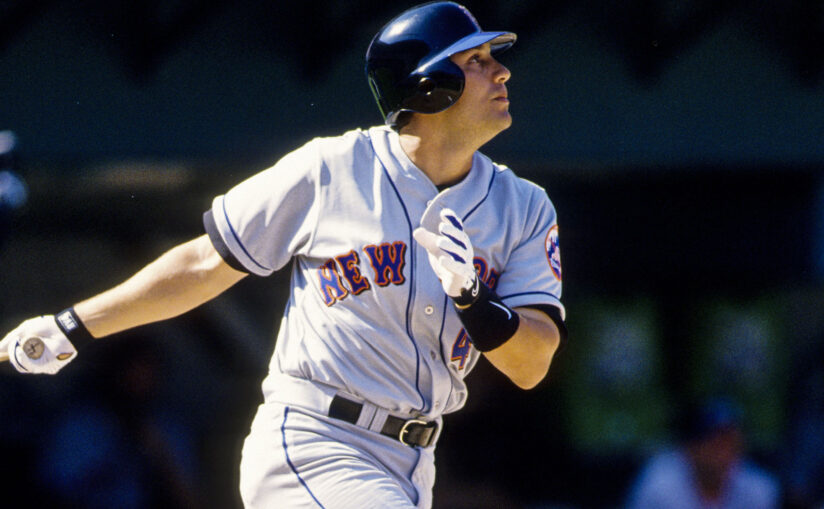
An unsung hero during the month-long tear, Harris thrived in the place of the injured Robin Ventura, hitting .383/.438/.605, striking out just six times in 90 plate appearances and notching ten extra-base hits. At the end of July, Harris headlined a two-game sweep of the St. Louis Cardinals to push New York ahead in the league standings: he went 3-for-4 out of the leadoff spot in the first victory before bringing in the go-ahead run on an eighth-inning pinch-hit the following night.
The hits would continue into a home NLDS preview with the San Francisco Giants, where Harris would reach base three times in a 2-0 victory. The win extended the Mets’ lead in the Wild Card race to four-and-a-half games, while closing the distance from the first-place Braves to just a game and a half. He’d collect three hits in the three-game sweep of the Rockies that ensued, going 2-for-4 in his lone start with an RBI double and a run scored.
Harris’ streak roared into the club’s road affair with the Los Angeles Dodgers, when he smacked two more hits out of the leadoff spot, including a home run, in a 9-6 rubber-game victory on August 20th. By the time September rolled around, Lenny had raised his season average nearly 70 points, and the Mets – now 79-54 – held a three-way tie with the Braves and Chicago White Sox for the best record in all of baseball.
With Payton and Agbayani firing on all cylinders in the corners of the outfield and Ventura and Zeile (somehow) outhitting him through the summer, Harris was confined to a utility role through September, only starting in four of the 21 games he appeared in. Even then, the veteran continued to feast on opposing pitchers, scratching off five pinch-hits and posting a .382 on-base percentage as the Mets settled for 94 wins and a virtually uncontested Wild Card berth.
As the Mets pushed past the Giants in four games and made a quick five games of work out of St. Louis, Harris would make just three appearances – all off the pine.
Down 2-1 in the bottom of the eighth in the third game of the NLDS, Bobby V sent Harris to the plate with Mike Bordick at first and no one out. Harris hit a chopper to second base that forced out the lead runner, but made it to first by the skin of his teeth to keep a runner in the picture. Harris stole second without a play following a Timo Perez popout, a maneuver that would set up a game-tying double off the bat of Edgardo Alfonzo. The Mets would go on to win by a final of 3-2 in the 13th inning on the back of a Benny Agbayani home run.
Lenny made his World Series debut against the Yankees in Game Two, going hitless in four at-bats, but scoring a run in the ninth after advancing on a fielder’s choice putout. The run was just one among five the Mets would string together between Jeff Nelson and Mariano Rivera, but the rally proved a day late and a dollar short, as the Amazin’s fell 6-5, and headed back to Queens down two games to none.
In his final appearance of the series in Game Four, Harris drew a walk, but was stranded at first base. He was one of just three Mets to reach base after the fourth inning. The Yankees would steal the fifth and final game with two runs off Al Leiter in the top of the ninth.
Harris remained a Met for the 2001 season, though his numbers wouldn’t come anywhere close to those of the Mets’ original pennant run. In 110 games, Harris batted .222/.266/.274 with just 21 starts to his name, and three errors in his 17 games between third base and first base. In his defense, nearly every Met batter that remained with the club after 2000 saw significant dropoffs in OPS, with the exception of Ventura and Mike Piazza, and the team finished 82-80 as a result – roughly nine games better than their run differential would’ve predicted (73-89 Pythagorean win-loss, if that’s your thing).
Despite being shielded from the infield and left-handed pitching (only 2 plate appearances all season), Harris still pieced together 21 pinch-hits – topping Major League Baseball leaderboards for a third consecutive season. His final hit of the season, albeit in front of a crowd of just 15,000 people, marked his 151st career pinch-hit, breaking Mota’s record and putting the game on hold as his teammates came out to congratulate him.
Desperate to get back on track, the Mets shook up the roster ahead of the 2002 season, and Harris would be one casualty among many. In a three-team deal in mid-January that also sent Agbayani and Zeile to Colorado, Harris and lefty starter Glendon Rusch were shipped to the Milwaukee Brewers in exchange for Jeromy Burnitz, Jeff D’Amico, Lou Collier, and Mark Sweeney. Only Burnitz and D’Amico would appear in a Met uniform, combining for a 0.2 bWAR en route to a 75-86 finish.
Harris, meanwhile, would remain in baseball for another four years, compiling another 61 pinch-hits between the Brewers, Cubs, and Marlins and winning a World Series ring with Florida in 2003.
In his final season in 2005, a 41-year-old Harris played in 83 games – 67 as a pinch-hitter – and batted .314/.385/.414 before announcing his retirement in 2006 during spring training. His 804 pinch-hit at-bats remain the most all-time.


